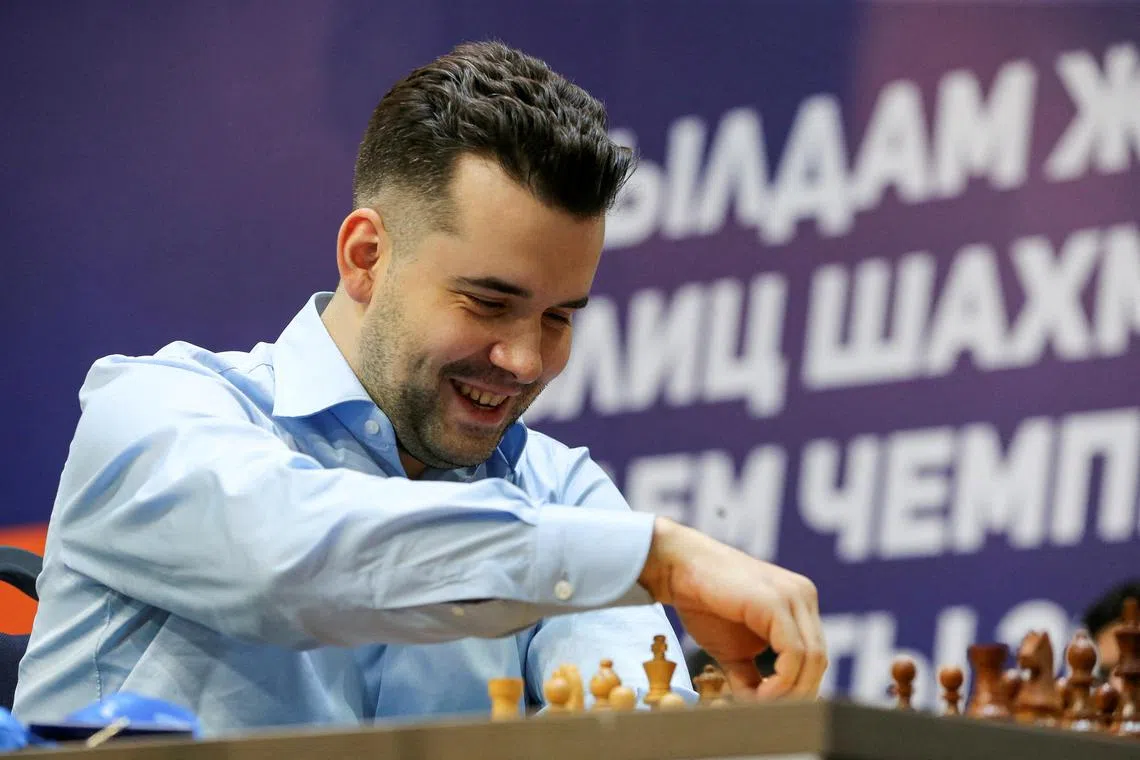A World Chess Championship without the world’s best player
Sign up now: Get the biggest sports news in your inbox

Russian native Ian Nepomniachtchi will take on Ding Liren of China in a best-of-14 match World Chess Championship.
PHOTO: REUTERS
ASTANA – As Ian Nepomniachtchi and Ding Liren played to a 49-move draw in the first game of the world chess championship on Sunday, their match-up – tinged with politics – played out in the shadow of an absent rival: Magnus Carlsen.
Carlsen, the Norwegian ranked No. 1 in the world, announced in 2022 that he would relinquish the crown he has held for the past decade.
In July, only seven months after he had routed Nepomniachtchi in the last of his four successful title defences, Carlsen said he lacked the motivation to prepare for another challenge – a process that can take months.
Instead, whoever wins the best-of-14 match in Astana, Kazakhstan, between Nepomniachtchi and Ding will have the official title of world champion and earn €1.2 million (S$1.74 million), which is a 60 per cent share of the prize fund.
The only problem is that Carlsen’s absence has robbed the match of its most compelling draw, and perhaps some of its legitimacy.
In March, in a call-in to the commentators of the American Cup, former world champion Garry Kasparov dismissed April’s showdown for the game’s greatest title.
“I can hardly call it a world championship match,” the 59-year-old said. “For me, the world championship match should include the strongest player on the planet, and this match doesn’t.”
Kasparov added that he was not trying to take anything away from the second-ranked Nepomniachtchi or the third-ranked Ding, who earned the right to play for the title by finishing first and second in the candidates’ tournament in 2022.
However, he noted that the game had to go back to 1975 to find the last time the undisputed champion did not play in chess’ ultimate showcase.
That year, Bobby Fischer, the temperamental American who had won the crown three years earlier, was stripped of the title because he and the International Chess Federation (Fide), the game’s governing body, could not agree on the terms of his title defence.
Yet even that comparison is not perfect, Kasparov said, because after winning the title in 1972, “Fischer stopped playing chess”.
Carlsen, he pointed out, most definitely has not.
That does not mean the match will proceed without drama. Even long before the players arrived, Fide was confronting a series of thorny public relations issues.
One of them is Nepomniachtchi’s Russian nationality.
Although he was one of 44 elite Russian players who signed an open letter in April 2022 condemning its invasion of Ukraine, and while sanctions mean he is playing under Fide’s flag – which makes him officially neutral – his beating Ding might put chess in an awkward position.
It would mean placing the game’s pre-eminent title in Russian hands for the first time since 2007 while the country continues to wage war in Ukraine.
He is not the championship’s only Russian connection – Fide president, Arkady Dvorkovich, is a former deputy prime minister of the country, though he, too, has been careful to distance himself from the invasion.
And the match’s main sponsor, Freedom Holding Corp, a Nasdaq-listed retail brokerage and investment bank, has raised its own concerns.
It is headquartered in Kazakhstan, but its founder, Timur Turlov, 35, is Russian. In June, Turlov switched his nationality to Kazakh, but he remains on the Ukrainian sanctions list.
A victory by Ding, meanwhile, would give China both the men and women’s world titles. Ju Wenjun, the women’s champion, is slated to play a title match against Lei Tingjie, who won the candidates’ tournament last week to guarantee the women’s title will go to a Chinese player.
Either way, the men’s title will be seen as a major prize by the country that claims it amid heightened geopolitical tension between Russia, China and the West. Should China claims both, its triumph would be ironical.
Chess was banned during the first eight years of the Cultural Revolution as a game of the decadent West.
By the end of the month, it could be home to multiple world champions. NYTIMES


